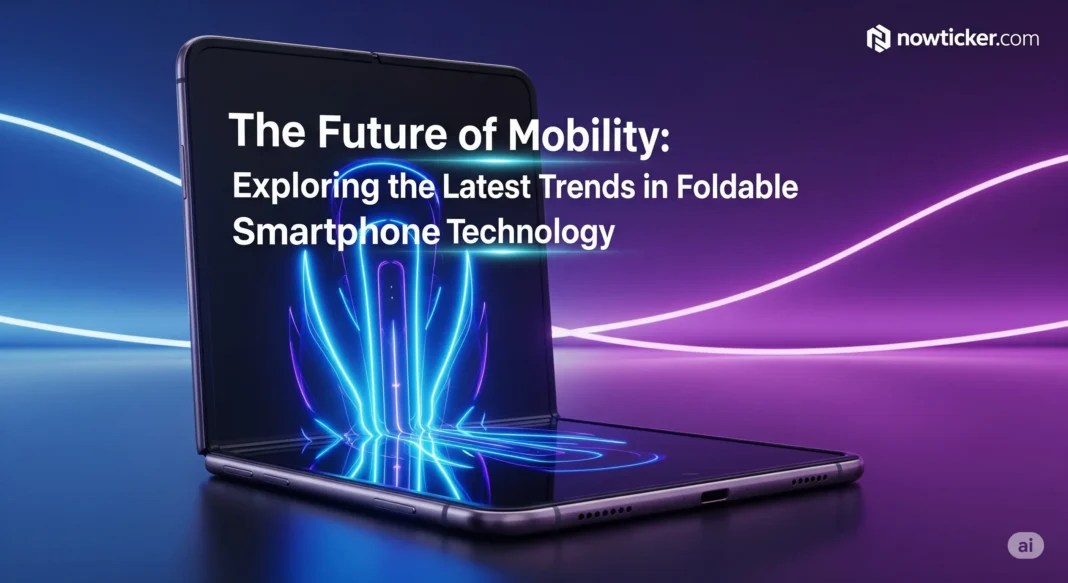Contents
- Introduction
- The Technology Behind Foldable Smartphones
- Real-World Applications: How Foldable Smartphones are Transforming Lives
- Trends in the Foldable Smartphone Market
- User Experiences: What Real Users are Saying
- Recommendations for Consumers
- FAQs
- 1. What is a foldable smartphone?
- 2. Are foldable smartphones more durable than traditional smartphones?
- 3. Can I use apps designed for traditional smartphones on a foldable smartphone?
- 4. What are the benefits of using a foldable smartphone?
- 5. Are foldable smartphones more expensive than traditional smartphones?
- Conclusion
Introduction
The evolution of smartphones has taken a remarkable trajectory, and one of the most fascinating developments is the advent of foldable technology. As smartphones become integral to our daily lives, foldable devices represent a fusion of practicality and innovation. These cutting-edge devices offer expansive screens while maintaining portability, thus redefining mobility. This article explores the latest trends, technical advancements, real-world applications, and user experiences surrounding foldable smartphone technology. We aim to provide an in-depth examination of its implications for the future of mobility, bolstered by expert perspectives and practical recommendations for consumers and stakeholders in the tech market.
The Technology Behind Foldable Smartphones
The essence of foldable smartphones lies in their innovative design and engineering. Utilizing flexible display technology, such as OLED (Organic Light Emitting Diodes), these devices offer an impressive blend of functionality and style. OLED screens are thinner and more flexible than traditional LCDs, allowing manufacturers to curve and fold the displays without compromising on quality.
In 2025, manufacturers like Samsung, Huawei, and Motorola have further refined foldable technology, improving hinge mechanisms and enhancing durability. The Galaxy Z Fold 4, for instance, features an improved hinge design that minimizes the crease effect, addressing one of the primary concerns among consumers. According to a study by DisplaySupplyChain Consultants, foldable smartphone shipments are expected to reach over 50 million units by 2025, signaling a promising market trend.
Users have reported positive experiences with the enhanced multitasking capabilities that foldable smartphones provide. The ability to run multiple applications side by side transforms how individuals manage their day-to-day tasks. As highlighted by a recent user review on TechRadar, "The multitasking capabilities of the Galaxy Z Flip are revolutionary. I can have my emails on one side and a video call on the other – it feels like having a mini workstation in my pocket."
Real-World Applications: How Foldable Smartphones are Transforming Lives
Foldable smartphones are not just a technological curiosity; they serve practical purposes in modern life. For instance, consider professionals who rely on smartphones for presentations and collaborative work. Foldable devices facilitate an easier viewing experience during meetings. An architect might carry a foldable smartphone to showcase designs, magnifying the impact of their presentation through an expansive screen.
Moreover, foldable smartphones cater to diverse lifestyles. Travelers find them particularly advantageous; a device that folds into a compact size is easier to slip into pockets or bags. User testimonials indicate increased satisfaction levels among frequent flyers, as they appreciate being able to watch videos or read articles on a larger screen without carrying additional gadgets.
Educational applications are also noteworthy. Schools and universities are beginning to incorporate foldable smartphones into learning environments. The flexibility allows for improved group collaboration in settings where space may be limited. A college student might use a folded smartphone during a group project, enabling them to review notes while simultaneously engaging in discussions with peers.
Trends in the Foldable Smartphone Market
As technology evolves, several trends are emerging in the foldable smartphone market:
1. Enhanced Durability
One key trend fostering consumer confidence is the improvement in durability. The use of Gorilla Glass and more robust materials protects screens against scratches and cracks. Additionally, manufacturers are focusing on testing hinge mechanisms rigorously, ensuring longevity and reliability.
2. Affordability and Diverse Options
While foldable smartphones were once considered premium luxury devices, the market is witnessing a shift towards more affordable options. For instance, recently released laptops like the Samsung Galaxy Z Flip Lite offer foldable technology at a lower price point, making it accessible to a broader audience. This democratization of technology is crucial for its widespread acceptance.
3. Sustainability in Design
Sustainability is another emerging trend. Manufacturers are increasingly adopting eco-friendly materials and practices in their production processes. This shift not only appeals to environmentally conscious consumers but also positions brands as responsible members of the technology ecosystem.
4. Integration of 5G Technology
With the rollout of 5G networks, foldable smartphones are increasingly incorporating this technology. 5G enables faster data speeds and lower latency, further enhancing the device’s potential. Users can enjoy seamless streaming and real-time collaboration, making foldable smartphones even more alluring.
5. Apps Tailored for Foldable Use
Developers are beginning to create applications specifically designed for foldable smartphone experiences. This trend reflects an understanding of user needs and takes full advantage of the larger screens, maximizing functionality and interactivity.
User Experiences: What Real Users are Saying
To deepen our understanding of foldable smartphones, we scoured the internet for authentic user reviews. Here’s what some users had to say:
Positive Feedback
Sophia M., an avid traveler, stated: "The Samsung Galaxy Z Flip has changed the way I document my trips. The flexibility allows me to capture stunning photos from different angles, and when I’m not using it, it folds up neatly!"
- James T., a college student, commented: "It’s perfect for my studies. I can watch lectures and take notes simultaneously. It has enhanced my productivity tremendously!"
Mixed Reviews
While many users were enthusiastic, some expressed concerns that highlight areas for improvement.
- Lily K., a tech enthusiast, noted: "I love the foldable design, but I worry about the durability of the screen. I’ve had a noticeable crease after a few months of use, which is disappointing."
In reviewing foldable smartphones, it’s essential to consider these user experiences, as they highlight both the advancements and challenges within this field. Such insights are invaluable for potential buyers and manufacturers alike.
Recommendations for Consumers
For those considering transitioning to a foldable smartphone, here are some practical tips to ensure a smooth experience:
1. Assess Your Needs
Before making a purchase, evaluate your specific needs. Consider factors like multitasking capabilities, camera quality, and how often you travel. This self-assessment will guide you to the best option.
2. Research Reliability
Look for devices with a reputation for durability. Checking user reviews can provide real-world insights. Avoid products from manufacturers that have previously faced reliability issues.
3. Explore Ecosystem Compatibility
Ensure that your chosen device integrates well with your existing tech. Check for compatibility with apps you frequently use, as well as syncing capabilities with other devices.
4. Consider Usage Patterns
Think about how foldable technology will fit into your lifestyle. If you are a heavy user who requires constant access to multiple applications, invest in a device that optimizes multitasking.
5. Stay Updated on Software Developments
As technology advancements occur rapidly, ensure that your device receives regular software updates. This guarantees access to the latest features and security patches, enhancing the lifespan and performance of your smartphone.
FAQs
1. What is a foldable smartphone?
A foldable smartphone is a mobile device with a flexible display that can fold in half, providing both compact portability and an expanded viewing area.
2. Are foldable smartphones more durable than traditional smartphones?
Generally, foldable smartphones have improved durability through enhanced materials and hinge mechanisms. However, the durability can vary by model, so research is crucial.
3. Can I use apps designed for traditional smartphones on a foldable smartphone?
Yes, most apps are compatible; however, some developers are creating applications tailored for the unique screen layout, maximizing the foldable experience.
4. What are the benefits of using a foldable smartphone?
Benefits include a larger screen for multitasking, compact design for easy portability, and innovative features that enhance usability across various tasks.
5. Are foldable smartphones more expensive than traditional smartphones?
While foldable smartphones initially carried a premium price, many affordable options are emerging in the market, making the technology increasingly accessible.
Conclusion
The future of mobility is undeniably intertwined with the advancements in foldable smartphone technology. With their unique ability to combine portability and functionality, these devices are shaping how users engage with digital content. As manufacturers continue to innovate, focusing on durability, affordability, sustainability, and integration with 5G, we can expect foldable smartphones to become a mainstay in our tech-savvy lives.
While challenges remain, such as concerns regarding screen durability and app optimization, the positive user feedback and ongoing developments inspire confidence in this burgeoning market. By paying attention to user experiences and implementing practical advice, both potential consumers and industry stakeholders can contribute to the successful evolution of foldable technology. As we look ahead, it’s clear that the journey of mobility is just beginning, offering exciting possibilities for how we interact with our devices and shapes the world around us.



